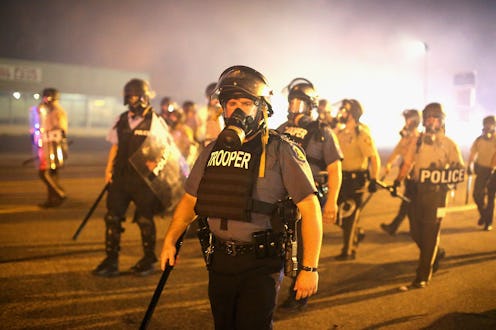News
Over 2000 National Guard Troops Are In Ferguson
Following a night of chaos and violence that resulted in more than 80 arrests, Missouri Governor Jay Nixon has ordered an additional 1500 National Guard troops into Ferguson, tripling the number stationed there already. Despite pleas from city, state and national officials for armed forces to show restraint when dealing with protestors, Nixon's latest move only seems to reinforce the notion of a police state in response to the gunfire, looting and burning of buildings that broke out throughout Ferguson and St. Louis on Monday evening. While many anticipated that Officer Darren Wilson would not be indicted on any charges for shooting and killing 18-year-old Mike Brown, the heartache and agitation remains as fresh as ever.
Ferguson Mayor James Knowles has criticized Governor Nixon for not acting fast enough in response to the widespread violence on Monday night, telling reporters at a news conference that significant security "was not deployed in enough time to save all of our businesses." Knowles continued,
The decision to delay the deployment of the National Guard is deeply concerning. We are asking that the governor make available and deploy all necessary resources to prevent the further destruction of property and the preservation of life in the city of Ferguson.
Apparently, a decided lack of communication between the mayor and the governor has lent itself to the problems in Ferguson, as Knowles admitted that he hadn't spoken to Nixon "since the third week of August." But regardless of who is to blame in the destruction that took place Monday night, one thing is clear — Ferguson needs help. At a news conference on Tuesday, Nixon said he was "deeply saddened for the people of Ferguson who woke up to see parts of their community in ruins." Pointing the finger at "criminals intent on lawlessness and destruction," Nixon vowed an improvement. "No one should have to live like this," he said, "No one deserves this. We must do better and we will."
This improvement, however, will come at the expense of a massive military force, nearly triple the number of troops that were stationed in Iraq at the beginning of 2014. 2,200 soldiers will be be stationed in Ferguson alone, a town that has a population of only 20,000. Over the course of a single night, Ferguson's headcount will increase by 10 percent, and every single one of them will be members of the military. Hundreds more will be stationed throughout the area in order to protect homes, businesses and individuals from the violence that many expect will only escalate on Tuesday evening.
USA Today reports that on Monday, protests reached a terrifying peak with demonstrators "taunting police, shattering windows and setting fire to two police cars. St. Louis County Police Chief Jon Belmar said at least a dozen buildings burned and that he had heard at least 150 gunshots, none fired by police." According to Belmar, only an enormous number of officials would not have been able to contain the effects of Monday evening. He told Bloomberg News, "I don’t think we were underprepared, but I’ll be honest with you, unless we bring 10,000 policemen in here, I don’t think we could prevent folks that really are intent on just destroying a community." Belmar also noted, "What I've seen tonight is probably worse than the worst night we had in August."
Law enforcement officials donned riot gear and utilized tear gas, pepper spray and bean bags in efforts to control the mayhem, but with little success. According to USA Today, "The area looked like a war zone Tuesday, with looted and burned out stores sitting amid broken glass and trash."
Charges for those arrested on Monday included arson, burglary, unlawful assembly and trespassing, and more of the same will likely take place on the second night of protests. Those taken into custody ranged in age from 17 to 66-years-old, and arrests were made throughout the day, with the first taking place at 9:20 am, and the last at 3:40 am.
While Ferguson prepares for another dark night, cities across the country are also bracing themselves for further protests, though few are expected to turn violent. Many of the demonstrations that took place immediately following the decision outside of Ferguson were relatively peaceful, with organizers in New York, Chicago, Seattle, Washington DC and Oakland offering their own signs of solidarity without the same degree of destruction.
During his press conference at the White House immediately following the announcement of the decision, President Obama said, "This is not just an issue for Ferguson. This is an issue for America." And while the issue does not seem to be going anywhere anytime soon, lawmakers across the country are making moves to ensure that the issue does not result in anymore death and destruction in the aftermath of an already unspeakable tragedy.
Images: Getty Images (2)
